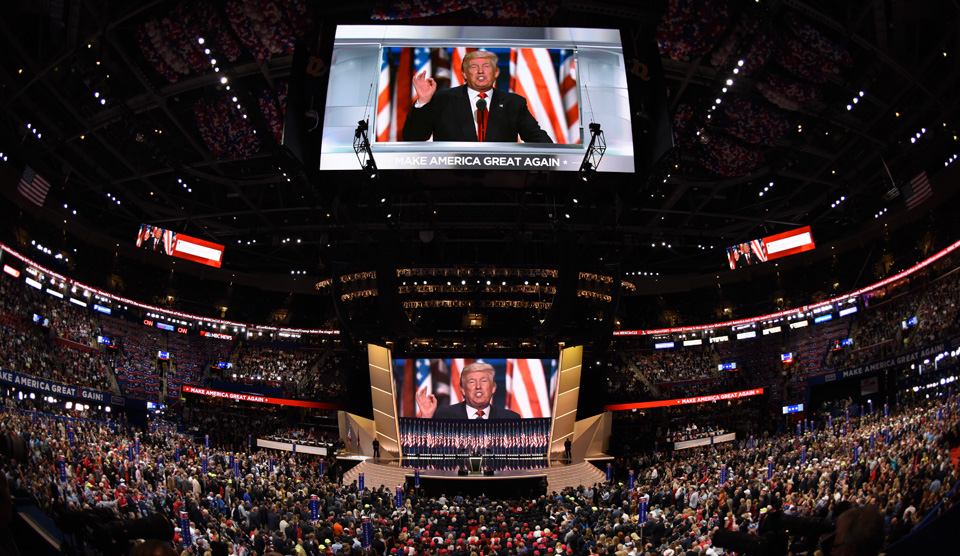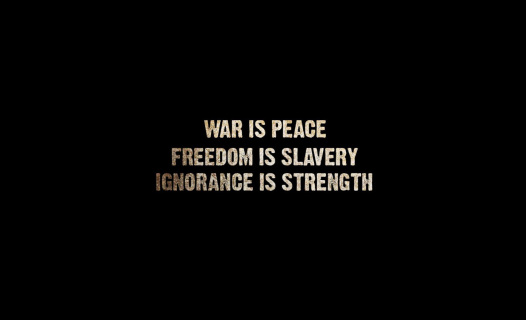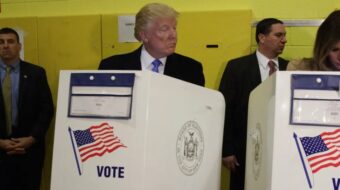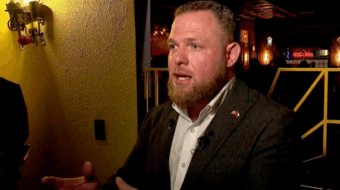
“If you want a picture of the future, imagine a boot stamping on a human face – forever…”
That quote is from George Orwell’s famous book, 1984. The English author of Animal Farm fame wrote the dystopian novel in 1949, just after World War II. Set in a place called Airstrip One (formerly Great Britain), it exists in a world of constant war, oppressive government surveillance, and public manipulation – all dictated by a political system under the control of a privileged elite that crushes individualism and demonizes independent thinking as “thoughtcrime.”
Perhaps that’s our future. Perhaps it is even part of our present.
Do you think I’m being melodramatic? Perhaps all the craziness of 2016 has officially made this Black woman lose her damn mind? No.
I look at current circumstances and can’t help feeling that the path our society appears to be heading down feels too reminiscent of dystopian comic books I’ve come to love, (such as Judge Dredd, V for Vendetta, and Civil War), but never imagined I’d be living in.
November 8, 2016 showed the world something, just like August 19, 1934 did in Germany (that’s the day German voters willingly gave Hitler supreme dictatorial power). It showed what happens when too many people choose something they believe might lead to their own comfort and security, even if it comes at the cost of justice and the rights of others. What we learned, as the quote which started this article says, is that love didn’t “Trump” hate on those two days; fear won out, and we are now all faced with living in the aftermath.
What heroes will emerge? What side of history will you be on? What can we learn from 1984 when it comes to the human condition and survival?
Don’t do it to me; do it to somebody else
I had already been thinking of 1984 when Trump became president-elect, but it wasn’t until this week that I knew I needed to revisit the book. This was the week Walter Scott’s murderer, a quick-to-shoot cop, was not brought up on charges after a mistrial – despite the fact that the shooting had been caught on video. Yet another instance when a plain-as-day murder of a human being is up for “debate” because the victim in question happens to be Black.
Then, to add insult to injury, on Friday, Dec. 2, the Supreme Court granted a review of the Ninth Circuit’s ruling that cops who provoke a violent confrontation, and then deal with you violently, can be held liable for what they do. What this means is that the Supreme Court has decided there are grounds to review whether or not it is really the cops’ fault if they provoke violence or disobedience, and then harm you. As one article put it, aptly: “Supreme Court To Decide If Cops Can Troll You, Then Shoot You.”
How are these incidents connected? Well, when Trump takes office, by the time the Supreme Court takes up this review, he will probably have appointed the next Supreme Court Justice – and we all know his pick won’t be nearly as progressive as Obama’s was. It’s completely possible this Justice will lead the Supreme Court into a ruling that says even if the police provoke violence and then harm/shoot/kill you – they are NOT accountable.
This will be another blow to protection under the law for the countless people – disproportionately African-American – who already find themselves on the wrong end of police brutality.
It’s another example of Election 2016’s ramifications for the marginalized and oppressed. And so comes a lesson from 1984:
“Sometimes they threaten you with something – something you can’t stand up to, can’t even think about. And then you say, “Don’t do it to me, do it to somebody else, do it to So-and-so.” And perhaps you might pretend, afterwards, that it was only a trick and that you just said it to make them stop and didn’t mean it. But that isn’t true. At the time when it happens you do mean it. You think there’s no other way of saving yourself, and you’re quite ready to save yourself that way. You WANT it to happen to the other person. You don’t give a damn what they suffer. All you care for is yourself.”
So it came and went.
A large portion of the population (although not the majority, since Clinton did after all win the popular vote) voted for a bigoted politician who fanned the flames of hatred, sexism, and xenophobia – but promised economic stability for some. Those who deemed themselves part of the “some” chose their own possible prosperity over the further oppression that would likely fall on others as a result.
Lies become truth
How did we get here? There’s been plenty of debate around it, but I think the next lesson of 1984 is clear:
“Everything faded into mist. The past was erased, the erasure was forgotten, the lie became truth.”
Did the Democratic party ignore the working class (read: white working class)? Did one too many so-called progressives think a protest vote was more important than actually ensuring a bigot didn’t win the highest office in the land? Was the white racist backlash against the Obama presidency just too much to overcome? Did the media help normalize a white supremacist viewpoint and Donald Trump? I’m of the mind that all of these, and perhaps a few more, factors played a hand in creating the state of affairs we now find ourselves in.
History was erased.
Those that should have did not account for what has happened in the past – a time when another person in power spouted similar rhetoric and used similar tactics. That time, in Germany, millions of people lost their lives as a result of “some” wanting to ensure their own prosperity.
The “lie became truth.” It continues today as the public is bombarded with fake news and with the mainstream media refusing to fact-check. As a recent article in the Washington Post pointed out, we may very well be entering the “post-truth era” with the Trump administration.
We have men willing to shoot up pizza shops because they wholeheartedly believe an online conspiracy theory, from far-right news sites, claiming that Democratic nominee Hillary Clinton and her campaign chairman John Podesta ran a child sex trafficking ring in the back room. These are examples of how lies can result in tragedy.
The question now is, what do we do?
No time to “wait and see”
There have been many calls to “wait and see” what will become of this presidency. There have been those who say that we should “wait and see” if Trump – and the white supremacists (read: I’m not entertaining any of that “alt-right” nonsense here), and the sellouts (read: Ben Carson), and other problematic figures being appointed to important decision making positions – will not actually be so bad.
Thus comes another lesson of Orwell’s dystopian novel:
“The aim of the High is to remain where they are. The aim of the Middle is to change places with the High. The aim of the Low, when they have an aim – for it is an abiding characteristic of the Low that they are too much crushed by drudgery to be more than intermittently conscious of anything outside their daily lives – is to abolish all distinctions and create a society in which all men shall be equal.”
We don’t have the luxury to “wait and see” what will happen to the immigrants and their families as talk of mass deportations is going on. We don’t have the luxury to “wait and see” as continued voter suppression tactics persist, further smothering the voice of the Black community. We don’t have the luxury to “wait and see” while the medical coverage that many people won with Obamacare is taken from them in a few short years. We don’t have the luxury to “wait and see” as there is talk of a MUSLIM REGISTRY in the United States of America in the year 2016.
You get the picture. Or rather, you can understand the words:
“All rulers in all ages have tried to impose a false view of the world upon their followers.”
Today’s false view is that there is something inherently wrong with standing up against this injustice and bigotry. That we have some sort of obligation to respect whoever takes on the office of president even if they do not respect us, and those around us, as full human beings who have rights to life, liberty, and the pursuit of true happiness. Happiness that does not come at the destruction of one’s marginalized neighbor.
And therein lies the biggest takeaway from Orwell:
“Until they become conscious they will never rebel, and until after they have rebelled they cannot become conscious.”
Let us find our voices in our resistance to bigotry and hate. Let us find our power in the struggle against oppression. Let us educate ourselves of a history that the oppressive forces in power want us constantly to forget.
And so, I revisited 1984 because one of my favorite books once again said to me what I needed to hear: “The best books, he perceived, are those that tell you what you know already.”
We already know what we must do. The question is – will we step up and do it?
Big Brother is watching, but so is history.










